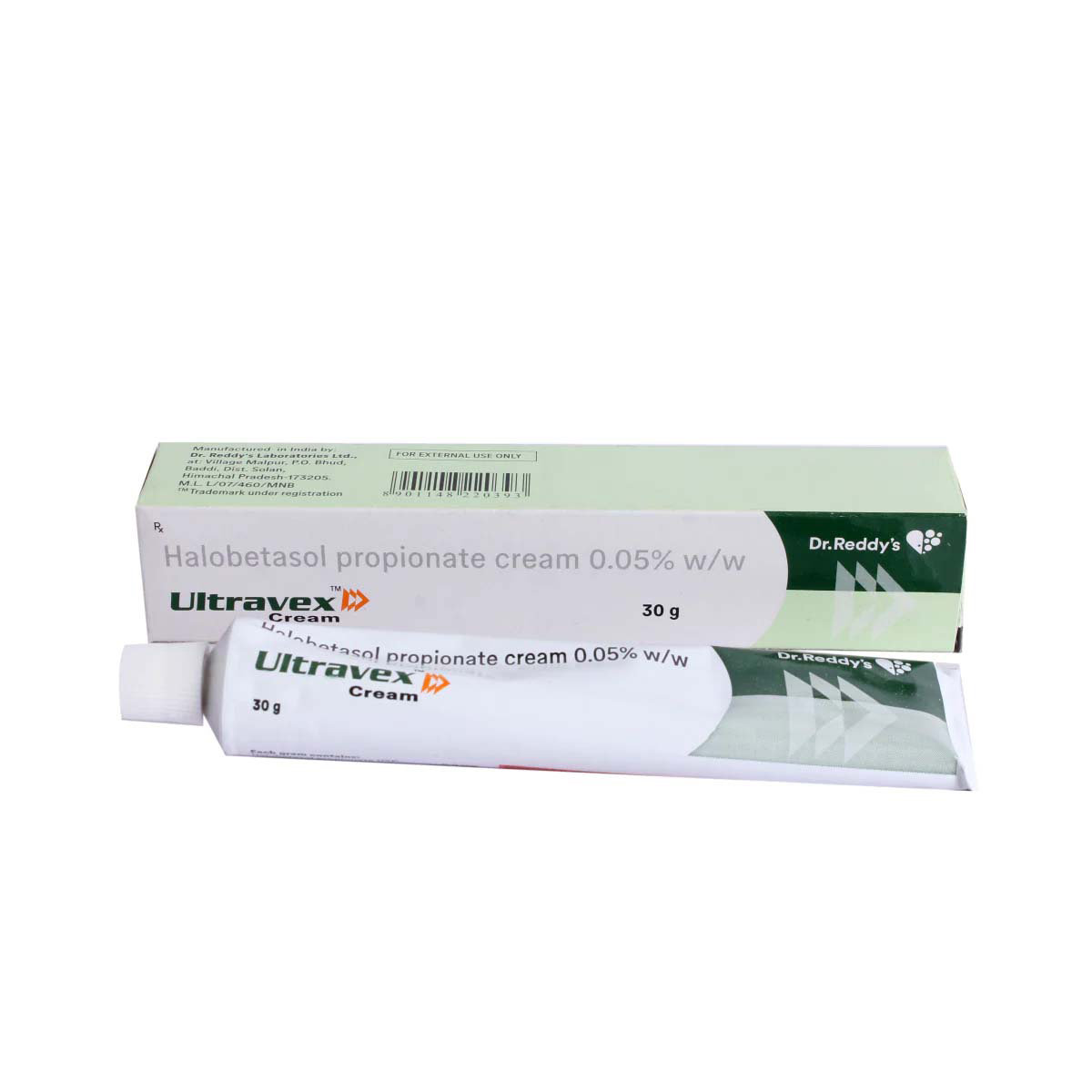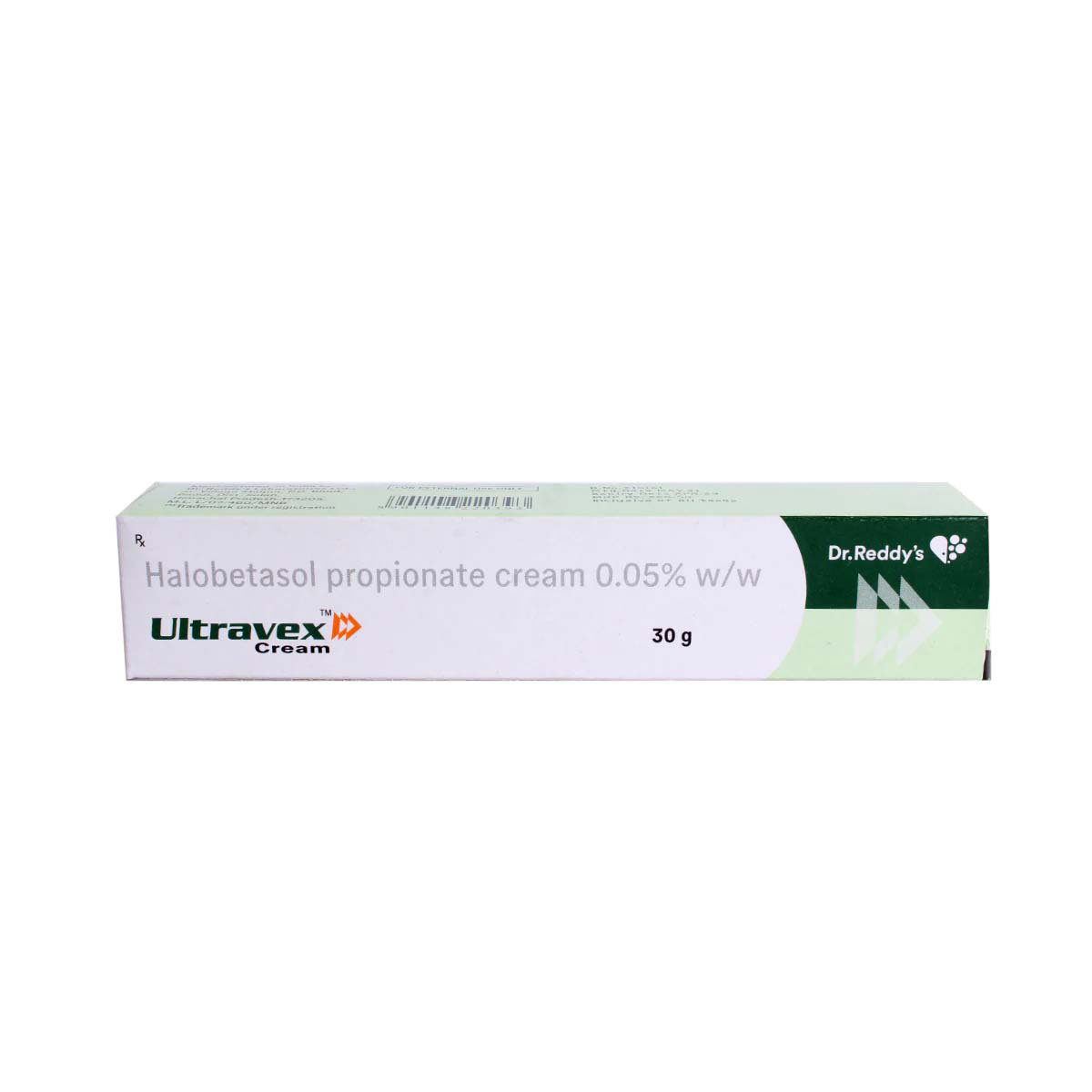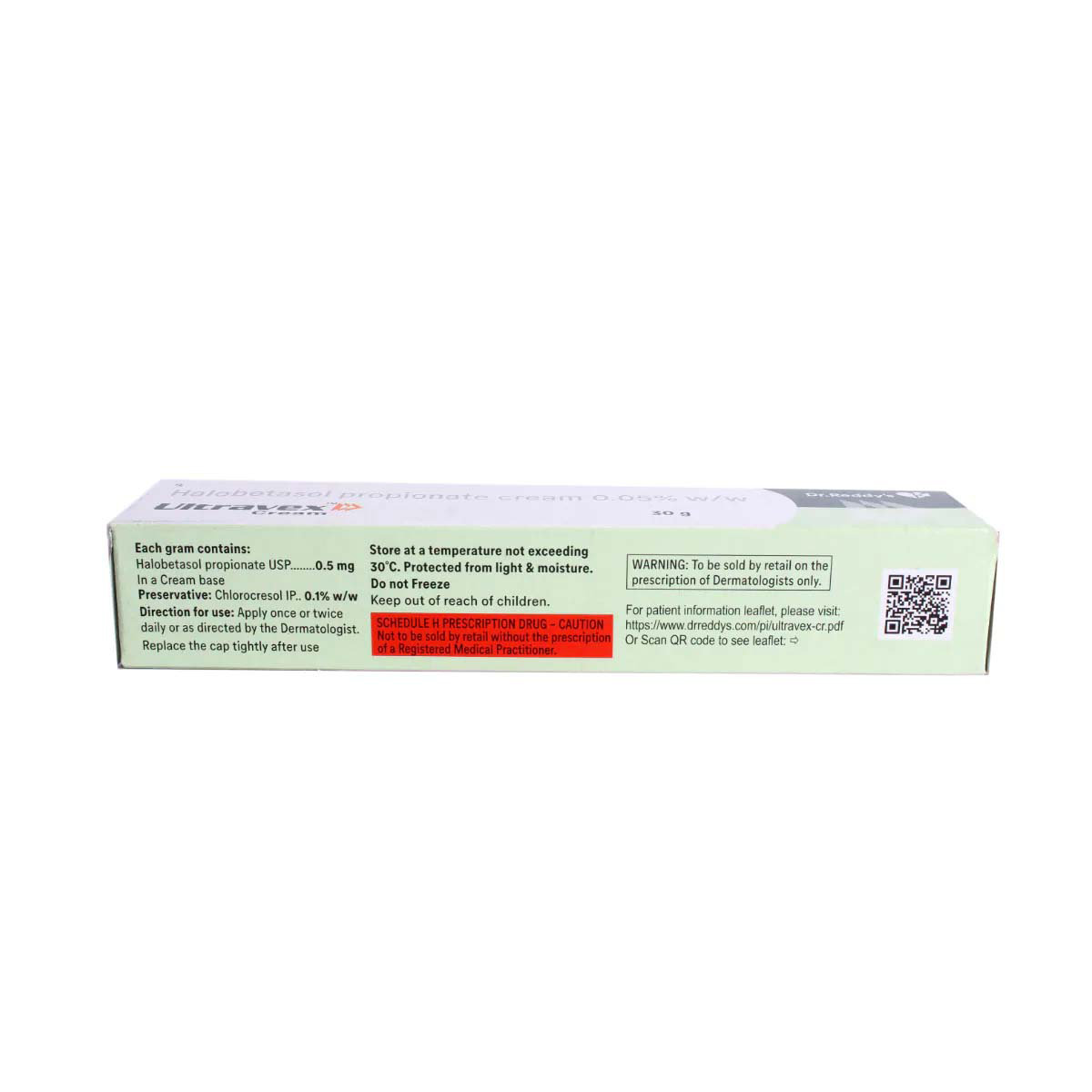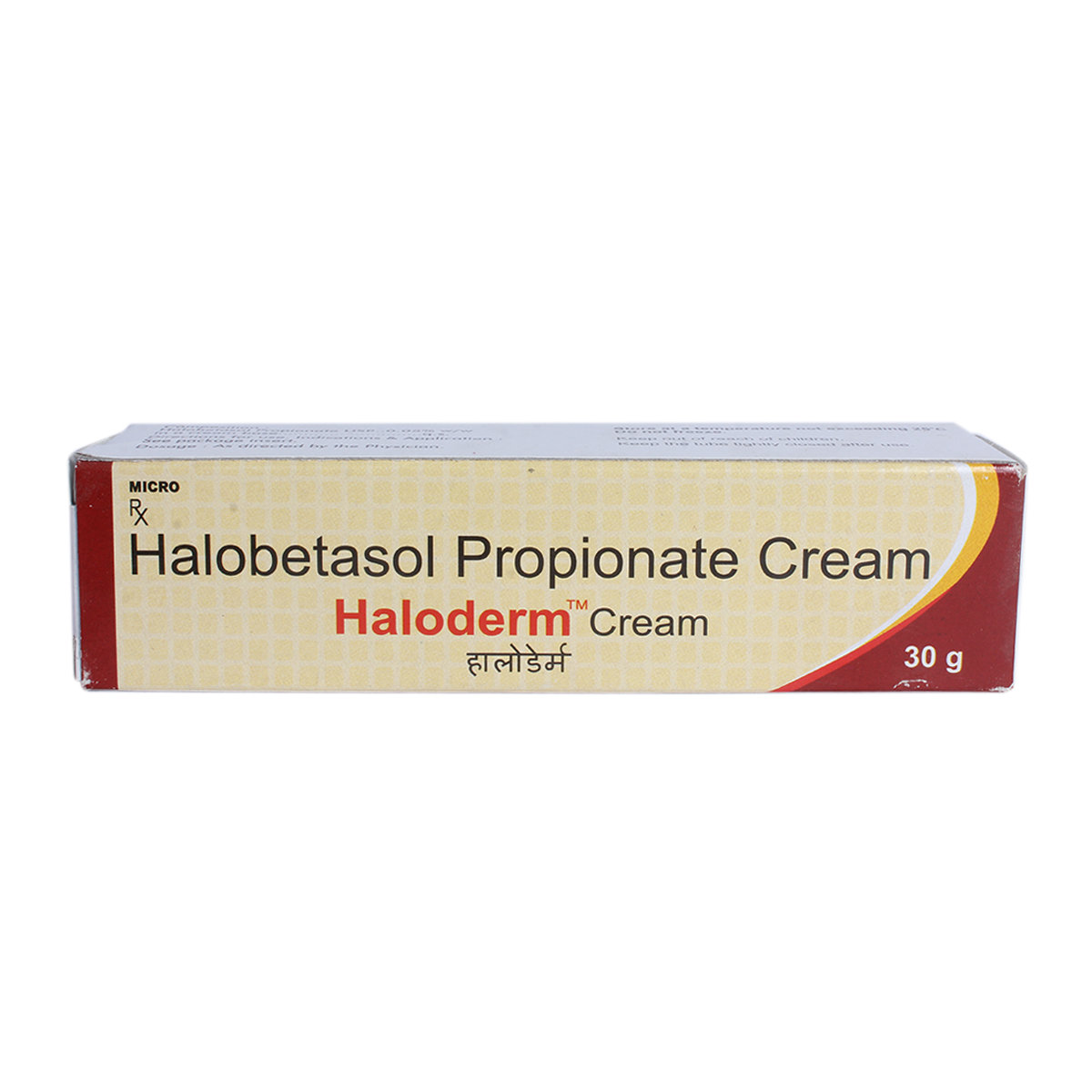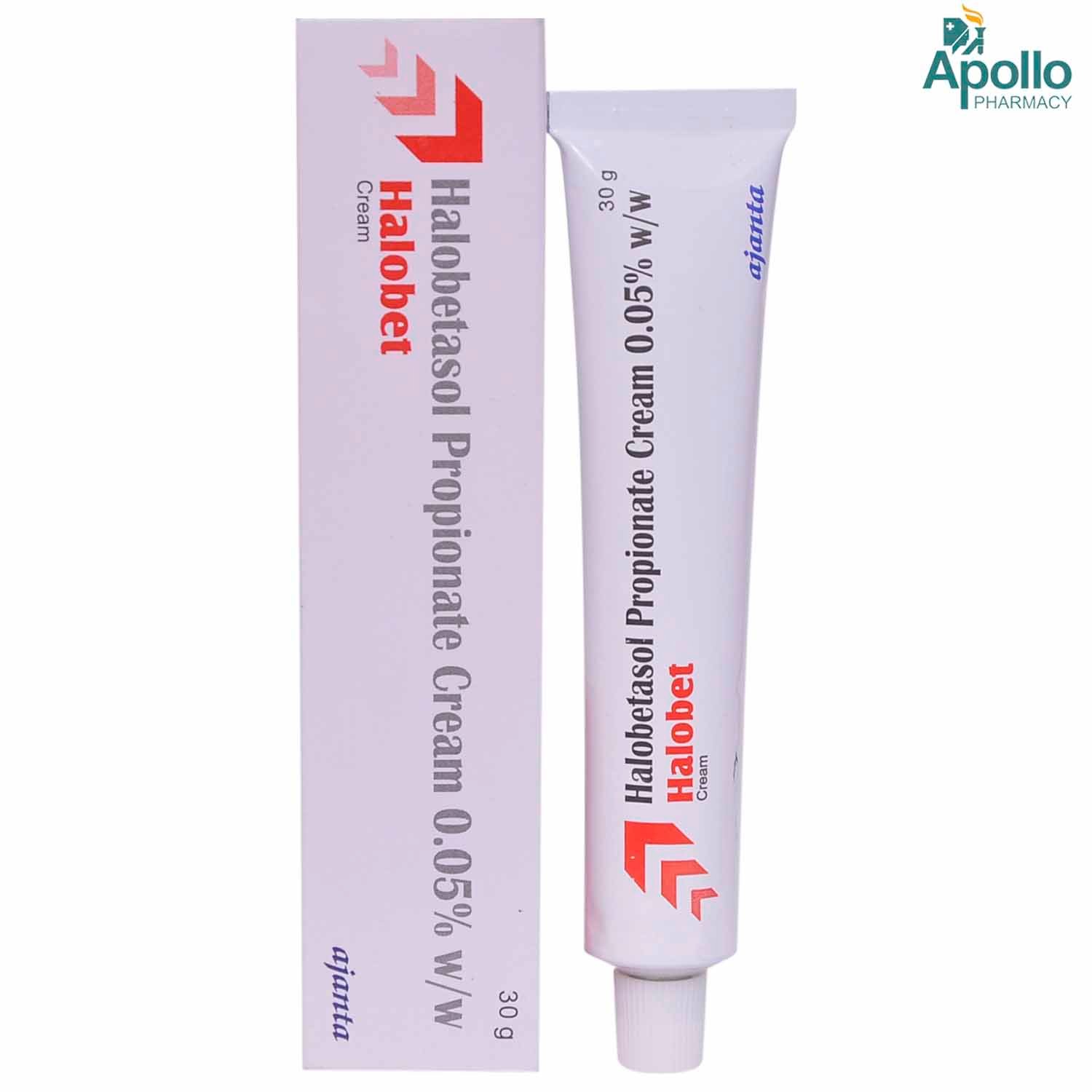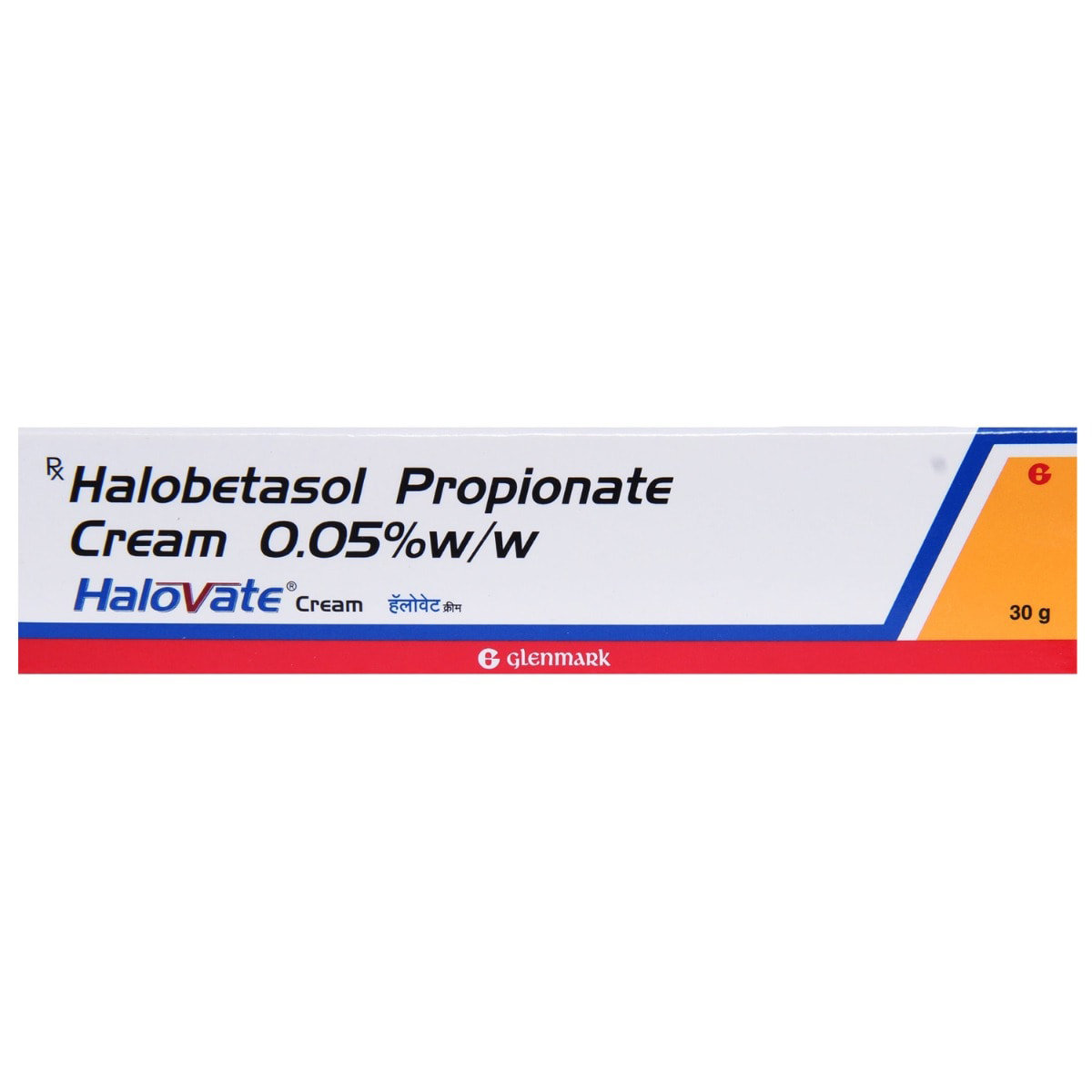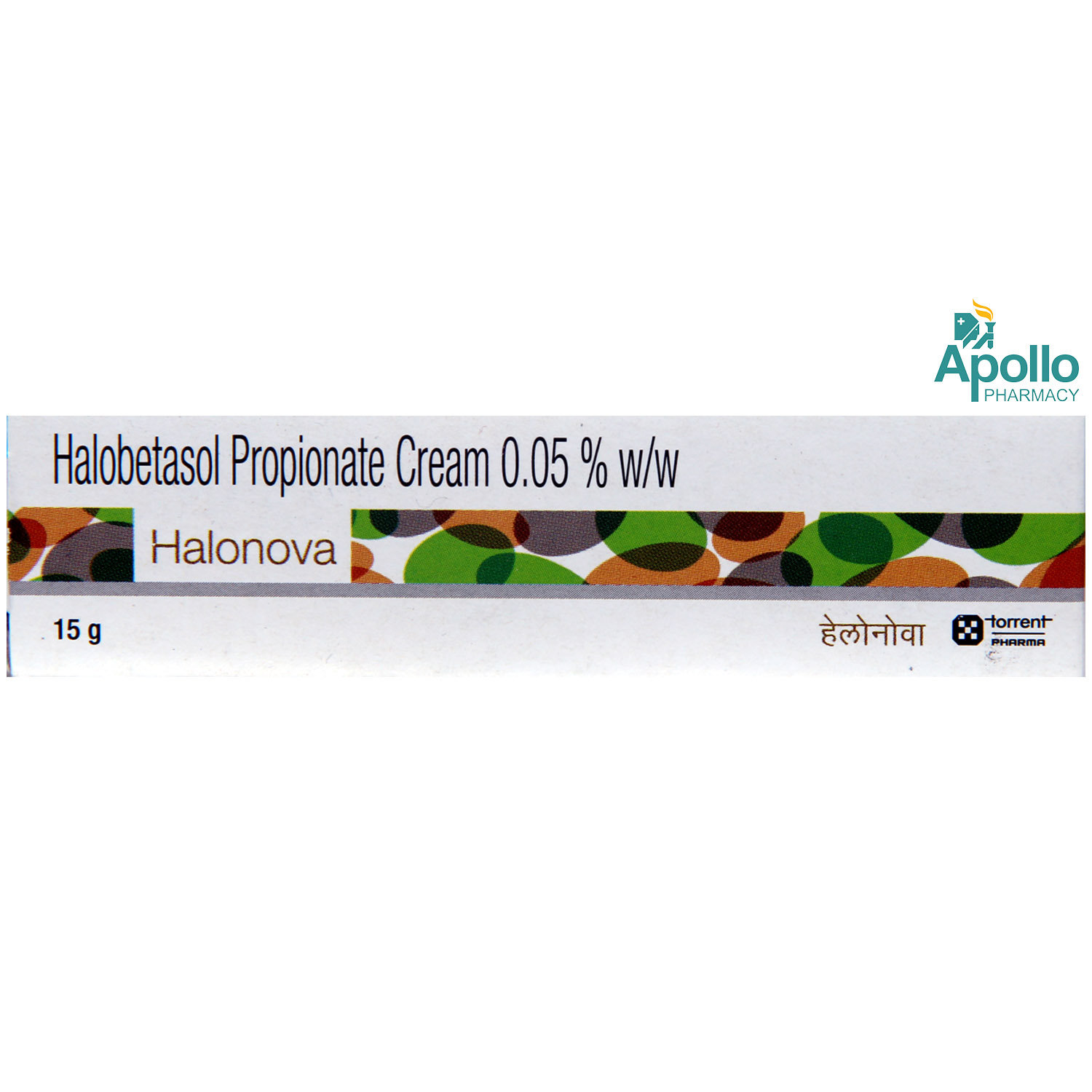Ultravex Cream 30 gm
MRP ₹354
(Inclusive of all Taxes)
₹53.1 Cashback (15%)
Selected Pack Size:30 gm
30 gm ₹318.6
(₹10.62 per gm)
In Stock
10 gm ₹99
(₹9.9 per gm)
Out of stock
15 gm ₹3238.18
(₹215.88 per gm)
Out of stock
Provide Delivery Location
Online payment accepted
 Prescription drug
Prescription drugWhats That
Composition :
Manufacturer/Marketer :
Consume Type :
Expires on or after :
Return Policy :
About Ultravex Cream
Ultravex Cream belongs to a class of drugs called 'corticosteroids' primarily used to treat skin condition like itching redness, irritation and inflammation caused due to plaque psoriasis (scales and itchy, dry patches) or any other inflammatory skin conditions. The skin's swelling occurs when an allergic reaction or skin irritation releases several substances in the skin that widens blood vessels and cause itching, redness, pain, and swelling in the irritated area.
Ultravex Cream contains Halobetasol that works by acting inside skin cells and inhibiting the release of certain chemical messengers in the body that cause redness, itching and swelling. When the skin reacts to any allergens, such chemicals are released normally.
Use Ultravex Cream as prescribed. Ultravex Cream is for external use only. Avoid contact of Ultravex Cream with nose, mouth or eyes. In case Ultravex Cream comes in contact with these areas accidentally, rinse with water thoroughly. Some people may experience dryness of skin, itching, pain, stretch marks, headache, burning or stinging sensation at the application site. Most of these side effects of Ultravex Cream do not require medical attention and gradually resolve over time. However, if the side effects persist or worsen, please consult your doctor.
If you are allergic to Ultravex Cream or any other medicines, please tell your doctor. If you are pregnant or a breastfeeding mother, it is advised to consult a doctor before using Ultravex Cream. Ultravex Cream is not recommended for children below 12 years of age as large amounts of Ultravex Cream may be absorbed through the skin easily in children and cause adverse effects. Avoid using Ultravex Cream on open wounds, windburned, sunburned, irritated or dry skin. Do not cover or wrap the treated area with a bandage unless advised by your doctor as it may cause harmful effects. Do not swallow Ultravex Cream. In case of accidental swallowing, consult a doctor immediately. Keep Ultravex Cream away from high heat or open flame as the container may explode if it is too hot. If you have diabetes, liver disease, adrenal gland disorder or any skin infection, inform your doctor before taking Ultravex Cream.
Uses of Ultravex Cream
Directions for Use
Key Benefits
Ultravex Cream is a steroid that helps reduce swelling, itching redness and irritation caused due to plaque psoriasis (scales and itchy, dry patches), dermatitis (itchy, swelling of the skin), eczema (itchy, cracked, swollen or rough skin) or other inflammatory skin conditions. Ultravex Cream acts inside the skin cells and inhibits the release of certain chemical messengers in the body that cause redness, itching and swelling. When the skin reacts to any allergens, such chemicals are released normally.
Storage
- Change positions or take a break from activity to relieve symptoms, as stinging can disturb your regular patterns.
- Avoid postures that put much pressure on the body area where stinging is felt.
- If you have a vitamin deficiency, take supplements or change your diet.
- Exercise regularly to improve inner strength.
- Follow your doctor's instructions to prevent stinging.
- Massage the affected area gently to get temporary relief.
- Burning sensation is an abnormal side effect that needs medical attention. To relieve the burning feeling, your doctor may prescribe painkillers or antidepressants.
- Focused exercises can improve strength and reduce burning by soothing muscles.
- Change in lifestyle and improving nutrition can reduce the causes of burning sensation and provide relief.
- Your doctor may suggest nerve block injections as it is related to sensation in the skin.
- Burning feeling in a specific area would need mild electrical currents to reduce pain that targets the nerve affected. This practice must be done only if your doctor mentions it.
Drug Warnings
If you are allergic to Ultravex Cream or any other medicines, please tell your doctor. If you are pregnant or a breastfeeding mother, it is advised to consult a doctor before using Ultravex Cream. Ultravex Cream is not recommended for children below 12 years of age as large amounts of Ultravex Cream may be absorbed through the skin easily in children and cause adverse effects. Avoid using Ultravex Cream on open wounds, windburned, sunburned, irritated or dry skin. Do not cover or wrap the treated area with a bandage unless advised by your doctor as it may cause harmful effects. Do not swallow Ultravex Cream. In case of accidental swallowing, consult a doctor immediately. Keep Ultravex Cream away from high heat or open flame as the container may explode if it is too hot. If you have diabetes, liver disease, adrenal gland disorder or any skin infection, inform your doctor before taking Ultravex Cream.
Drug-Drug Interactions
Drug-Drug Interactions
Login/Sign Up
Drug-Food Interactions
Drug-Food Interactions
Login/Sign Up
Diet & Lifestyle Advise
- Eat foods rich in quercetin (a flavonoid) such as apples, cherries, broccoli, spinach, and blueberries.
- Consuming food rich in probiotics helps in developing the immune system against allergies.
- Limit intake of food that might trigger allergies such as dairy products, soy, eggs, and nuts.
- Avoid consumption of foods with excess sugar as it may flare up inflammation.
- Include fruits, vegetables, whole grains, healthy fats, and fish in your diet.
- Reducing stress and maintaining a regular sleep pattern would be helpful.
- Avoid getting in contact with harsh soaps, detergents, and rough fabrics.
Side Effects of Ultravex Cream
- Dryness of skin
- Itching
- Pain
- Stretch marks
- Headache
- Burning or stinging sensation at the site of application
Habit Forming
Therapeutic Class
All Substitutes & Brand Comparisons
RX
Out of StockNot for online saleHaloblix Cream
Zeelab Pharmacy Pvt Ltd
₹25
(₹1.5/ 1gm)
85% CHEAPERRX
Halopad Cream 30 gm
Leogard Pharmaceuticals Pvt Ltd
₹180
(₹5.4/ 1gm)
49% CHEAPERRX
Haloderm Cream 30 gm
Micro Labs Ltd
₹218
(₹6.54/ 1gm)
38% CHEAPER
Author Details
We provide you with authentic, trustworthy and relevant information
Drug-Diseases Interactions
Drug-Diseases Interactions
Login/Sign Up
FAQs
Special Advise
- Regularly monitor blood sugar levels while taking Ultravex Cream as it may increase blood sugar levels.
- Avoid using Ultravex Cream for more than 2 weeks without the doctor’s advice as it may increase the risk of adverse effects.
Disease/Condition Glossary
The skin's swelling occurs when an allergic reaction or skin irritation releases several substances in the skin that widens blood vessels and cause itching, redness, pain, and swelling in the irritated area. Plaque psoriasis is an autoimmune skin condition and is the most common form of psoriasis in which skin cells multiply faster than normal, resulting in white scales and itchy, red dry patches. Dermatitis is a common skin condition associated with dry, itchy or swollen skin. Eczema is a skin condition that causes itchy, cracked, swollen or rough skin.

Have a query?
Alcohol
Safe if prescribed
Please consult a doctor before consuming alcohol while using Ultravex Cream.
Pregnancy
Consult your doctor
Ultravex Cream is a Category C pregnancy drug and is given to a pregnant woman only if the doctor thinks benefits outweigh risks.
Breast Feeding
Consult your doctor
The excretion of Ultravex Cream in human milk is unknown and is given to a breastfeeding mother only if the doctor thinks benefits outweigh risks. However, if prescribed by a doctor, do not apply Ultravex Cream on breast areas to prevent accidental ingestion of Ultravex Cream by the baby.
Driving
Safe if prescribed
Ultravex Cream usually does not affect your ability to drive or operate machinery.
Liver
Consult your doctor
If you have any concerns regarding the use of Ultravex Cream in patients with liver problems, please consult a doctor.
Kidney
Consult your doctor
If you have any concerns regarding the use of Ultravex Cream in patients with kidney problems, please consult a doctor.
Children
Safe if prescribed
Ultravex Cream is not recommended for children below 12 years of age as large amounts of Ultravex Cream may be absorbed through the skin easily in children and cause adverse effects. However, please consult a doctor before using Ultravex Cream in children.

